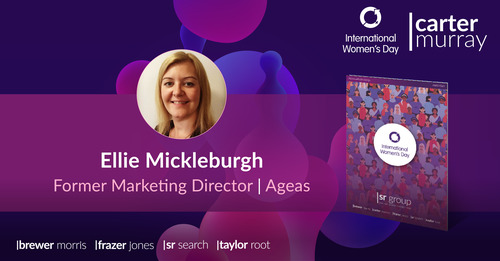IWD2021 #ChooseToChallenge: Ellie Mickleburgh

Disclaimer: Please note that all commentary and opinions provided in this interview are those of the individual and not the organisation/company they are employed by.
What skills and attributes do female leaders bring to create diverse leadership at management level?
In my experience, women tend to be more assertive and persuasive, more empathetic and flexible, they tend to read situations more accurately and therefore respond better. The people they are leading often feel more understood and valued. In a less hierarchical business (which is becoming a more popular structure style), female leaders can bring teams along with them and lead in a more authentic way. There are now lots of studies demonstrating that the male style of leadership is outdated and this is not how many employees want to be led or managed.
What does “choose to challenge” mean to you?
Choose to challenge – to me this means actively deciding to put your hand up and be the one to do things differently, demonstrating that a different way can work better. Not putting up with the status quo and being comfortable with the need to be different. Also being prepared that not everyone will like it or like me but that I’m paving the way for those who come after me. In addition to this it means challenging the behaviours you see around you and not putting up with people behaving badly. Standing up for those who might not have a strong voice or a strong position but giving them a voice through your voice and helping them to be heard.
What is one lesson you learnt the hard way?
“Not everyone wants to change”. I joined a business that was very male dominated at management level, thinking I could be a pioneering senior female leader but the culture didn’t feel right. Within the first few weeks of joining I was coming up against male peers who were undermining me and looking to trip me up. There was a culture of competition not collaboration. The business wasn’t ready to change and didn’t want to change. Needless to say I left quickly to find somewhere where I could have a more positive impact.
How can female leaders ensure they get a seat at the table?
“If you don’t ask, you don’t get”. Firstly, you need to ask or better than that, assume an invite. I see many female managers who are sat in the corner waiting to be invited – you need to get out of the corner and tell them you’re coming – to the meeting, to the project team or whatever it is. Just make sure you’re involved. Don’t make them guess whether you want to be involved – tell them that you do. And then show the value you bring – demonstrate what you can add by being there and why they need you to be there.
What impact could Kamala Harris’ appointment to Vice President have on the next generation of female leaders?
It’s so good to actually see a highly visible female leader – often even when females become CEOs or high level execs, we hear about their appointment and then they disappear from view. Here is a female leader we will see and hear from on a regular basis. She will embody “if we can see it, we can be it”. My hope is this will inspire a generation of females to believe more of themselves.
What is one thing women don’t talk about enough?
How it feels when men have a conversation (usually about sport!) which excludes the females in the room – and how to address it. I actually love sport and know quite a bit about a wide variety of sports but when the men in the room start to talk about sport it is only ever addressed to the other men – I can see their surprise when I make a knowledgeable comment which often brings the conversation to a close so we can get down to business. This is my small way of breaking down this exclusive club. Turning to topics which include everyone, where everyone can contribute and feel valued and involved.
Click below to read the full edition of IWD2021 #ChooseToChallenge: Female Leaders Across The Globe.https://indd.adobe.com/embed/bb2678fd-fafb-4e5f-b57b-bbe97612e7cf?startpage=1&allowFullscreen=true